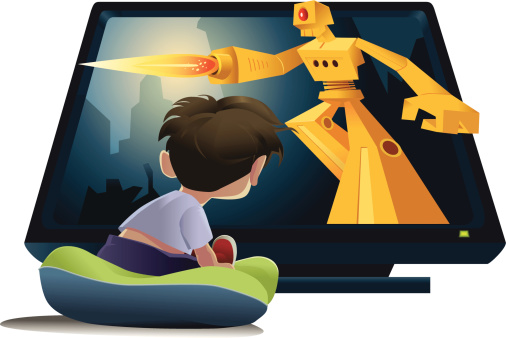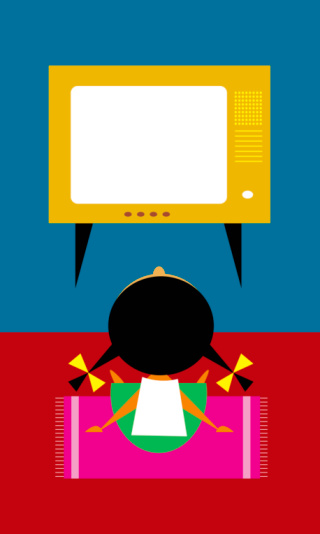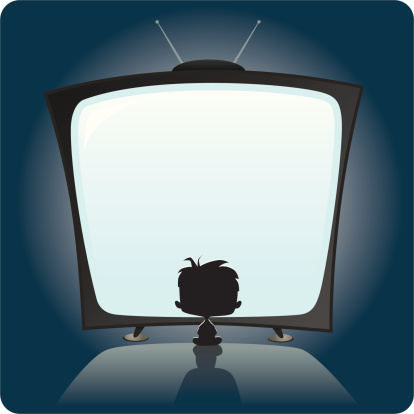screen time confessions: dr. eric berger
 Confession # 1: I love my TV, my computer, and my phone! At the end of a long day, I love flipping through channels, watching a game, or catching up on a show. It relaxes me. When I was a kid, I loved to watch a show or two after school and lounge in front of cartoons on Saturday mornings. My parents loved that I was occupied while they cooked and “slept in.” My wife, on the other hand, did not grow up with a TV. Blessed with far more energy than I, she does not need screen time as down time, either personally or for our kids. Parenthood forces us to confront our differences.
Confession # 1: I love my TV, my computer, and my phone! At the end of a long day, I love flipping through channels, watching a game, or catching up on a show. It relaxes me. When I was a kid, I loved to watch a show or two after school and lounge in front of cartoons on Saturday mornings. My parents loved that I was occupied while they cooked and “slept in.” My wife, on the other hand, did not grow up with a TV. Blessed with far more energy than I, she does not need screen time as down time, either personally or for our kids. Parenthood forces us to confront our differences.
A recent American Academy of Pediatrics policy statement on Media Education gives us some sobering facts. On average, by the time the young children of today reach age 70, they will have spent the equivalent of 7-10 years of their lives watching television. More than 70% of American teenagers have a TV in their bedroom. Half have a VCR or DVD player, and half have a video game console. TV viewing and access to other visual media is now starting earlier and earlier, with a recent national report claiming that nearly two thirds of infants and children less than 2 years of age watch TV for an hour and half a day. The increasingly widespread availability of tablets and smartphones will likely boost these numbers well into the future.
Despite this, my professional organization does not completely shame me when I seek solace by planting my kids in front of the TV, phone, or computer. Although the AAP nixes visual media for children under 2, it allows up to 2 hours a day for kids over 2. Clearly, this is far less than the average child currently takes in, but more than most of us would expect. Before holding a victory parade for TV or just singing its praises, it’s important to think about what this does and does not mean.
 Confession # 2: Just because screen time is allowed, we should not fool ourselves into believing that it is developmentally beneficial for our children or a substitute for other important childhood activities. In 2007 the journal Pediatrics ruined many parents down time when it published an article refuting that Baby Einstein turned your baby into Einstein. Rather, infants who did not watch so called “baby videos” had higher vocabularies than those that did. Human responsiveness to the child’s sounds and cues, along with reciprocal interactions, drives early language development much more significantly than anything that screen time can provide. Solitary time in front of the TV is time away from this special stimulation.
Confession # 2: Just because screen time is allowed, we should not fool ourselves into believing that it is developmentally beneficial for our children or a substitute for other important childhood activities. In 2007 the journal Pediatrics ruined many parents down time when it published an article refuting that Baby Einstein turned your baby into Einstein. Rather, infants who did not watch so called “baby videos” had higher vocabularies than those that did. Human responsiveness to the child’s sounds and cues, along with reciprocal interactions, drives early language development much more significantly than anything that screen time can provide. Solitary time in front of the TV is time away from this special stimulation.
As our infants become preschoolers, we are tempted to site other so-called educational values of screen time in order to feel good about our kid’s TV time. No doubt, children can learn some things from TV. My son has learned about some letters, the habitat of Peregrine Falcons, and the best way to turn a house-hold appliance into a phone charger. But, many TV shows, especially those “feel good” moralistic ones, can teach unintended lessons. Studies over the last decade have shown that viewers of Arthur and other similar children’s shows demonstrated more anti-social behavior than non-viewers, even though the main point of the show was to teach civility.
 The problem is that so many children’s programs focus most of story on the negative behaviors, and then leave only a few minutes towards the end to explain a resolution or better alternative. Preschoolers, with limited ability to hold large chunks of information in their heads, do not make the connection between the first 2/3 of the show and the latter 1/3. Rather, they remember the entertainment value of the negative behaviors. So many cartoons and Disney or Pixar movies include violence and verbal insults in the developing story, which may end with a moralistic lesson. The preschoolers cannot connect in their minds the beginning, middle and end of the show. Each part exerts its influence independently. After I took my then 4 year old son to see Beauty and the Beast, I was appalled that the only lines he remembered were Gaston’s utterances of “Kill the Beast.” However, in retrospect, it makes total sense—Gaston was a cheery character, with a lot of physical attributes, lots of friends, and a great voice!
The problem is that so many children’s programs focus most of story on the negative behaviors, and then leave only a few minutes towards the end to explain a resolution or better alternative. Preschoolers, with limited ability to hold large chunks of information in their heads, do not make the connection between the first 2/3 of the show and the latter 1/3. Rather, they remember the entertainment value of the negative behaviors. So many cartoons and Disney or Pixar movies include violence and verbal insults in the developing story, which may end with a moralistic lesson. The preschoolers cannot connect in their minds the beginning, middle and end of the show. Each part exerts its influence independently. After I took my then 4 year old son to see Beauty and the Beast, I was appalled that the only lines he remembered were Gaston’s utterances of “Kill the Beast.” However, in retrospect, it makes total sense—Gaston was a cheery character, with a lot of physical attributes, lots of friends, and a great voice!
Most of us will freely admit that violent shows and games can numb our children, as they approach school age, to the unfortunate realities of our world. While parents often claim that their child’s laser-focus on a screen is evidence of their capability to focus, and others may suggest that the screen time may strengthen this skill, screen time can actually weaken the child’s ability to focus. Children may be able to sit in front of a TV or video game console for hours, but the nature of TV and video games is such that minimal sustained, internally-generated focus is required. The rapidly changing pictures on the TV screen or the instantaneous feedback offered by video games force the brain to re-focus every second. Thus, little of the sustained focus, that is needed to read a book, listen to a teacher, or navigate most of real-life’s tasks, is required. Our ability to attend is not measured by our focus when something is highly engaging, but rather by our ability to ramp up this ability during less engaging subject matter. Like a muscle, this part of the brain needs exercise to strengthen it. Screen time is usually a “free ride.”
 The truth hurts! It’s hard to justify screen time as anything more than a great promoter of my own sanity, rather than great promoter of my child’s developing brain. So, where does this leave me with my wife? The AAP does, after all, set the limit at 2 hours, not 2 minutes.
The truth hurts! It’s hard to justify screen time as anything more than a great promoter of my own sanity, rather than great promoter of my child’s developing brain. So, where does this leave me with my wife? The AAP does, after all, set the limit at 2 hours, not 2 minutes.
I guess that I can say nothing but, “Thank You!” Thanks for trying to keep my kids away from screen time until they were at least 2. Thanks for believing that 2 hours of daily screen time after 2 years of age, even though permissible by AAP, still seems like a lot. Thanks for tirelessly working to arrange other, more developmentally stimulating activities such as games, hikes, and crafts, instead of TV time. Thanks for forbidding TV at bedtime, mealtime, and other prime family interaction times. And finally, thank you…..for passing the remote! I still need my down time.
Stay sane….
Eric
 33 Rock Hill Rd
33 Rock Hill Rd 1740 South Street
1740 South Street 2365 East York Street
2365 East York Street